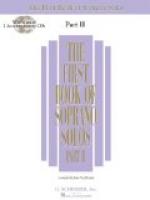Presently she resumed: “When I sang Sunday, I remembered something that Mr. Bond had said. I was afraid lest some inattention or failure to just grasp and mean the sentiments I sang might make my worship unacceptable. But I remembered that in the Tabernacle service after the priest had done all he could—at the brazen altar, and the laver, you know, having his heart set right and his conduct cleansed—still there was provided blood on the horns of the altar of incense beside which he worshiped. After all he could do he might still need it, I suppose. So I thought that although my poor service is very imperfect, and must come far short of what it ought to be, at best, still there will always be the blood and I shall take refuge in that.”
Winifred looked at her friend wonderingly.
“That is very beautiful, Adele,” she said. “I am glad to see it.”
Adele’s words had opened a dim vista of possibility, very precious, and had suggested arms wherewith to resist any shrinking self-fear or accusation that might attack her by the way. But though her “gift,” as Mrs. Butterworth and her mother called it, might some day be transmuted into a true gift of the Spirit, she felt with instinctive spiritual repugnance that its sphere of use would not be the former theater of her vanity. Adele might still sing in the chancel the canticles of the church, but as for her the associations of the choir of Doctor Schoolman’s church were far too unhallowed to admit of a return to them. To her it was so clear that she wondered a little why Adele and she should take no nearer ground as to their respective action.
“I suppose,” she said aloud with a little perplexity, “that we must each do what seems right, according to the clearest light we have. We may not both see all the truth about anything at the same time.”
“No,” said Adele with a decisive shake of her head, “and we can’t walk by each other’s consciences. But talking about seeing ‘all the truth’ makes me think of something. You know I was in the Berkshire Hills last summer? Well, I saw Greylock from several points of view. From one it seemed a rather sharp spur; from another it was long and obtuse; and from the last,—when somebody pointed out an ordinary, featureless ascent and said: ‘That’s Greylock,’ I could scarcely believe it. I imagine our views of the truth are somewhat like that. It will take time to walk all around it, I think.”




